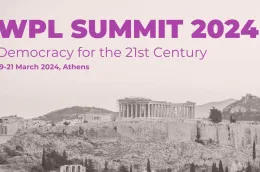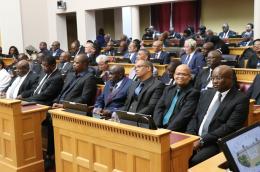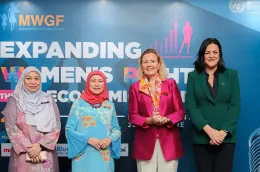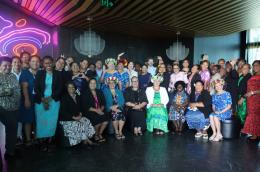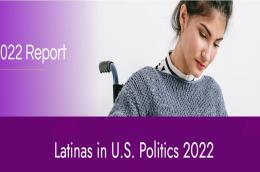Women's Leadership
Main navigation
In the heart of Athens, beneath the watchful eyes of history, a groundbreaking event is set to unfold that promises to reshape the landscape of political leadership across the globe. From April 19-21, the Women Political Leaders (WPL) network will convene for its annual summit, a gathering that not only honors the strides taken towards gender equality in political arenas but also, under the patronage of President Katerina Sakellaropoulou, aims to dismantle the longstanding barriers still facing women in politics today. Organized in collaboration with Greece's Ministries of Tourism and Cohesion & Family Affairs, this summit isn't just a meeting; it's a testament to the country's commitment to leading by example in the quest for a more inclusive political discourse.
Empowering Women Leaders: The Agenda
The Athens summit is more than a ceremonial congregation; it's a beacon of hope and a call to action. With over 200 delegates expected to participate, the discussions will pivot around not just celebrating past achievements but forging new pathways to ensure women's voices are not just heard but are influential in shaping policies and decisions. The highlight of the event is an awards ceremony that pays tribute to women politicians who have been instrumental in breaking down stereotypes and challenging the discrimination that has historically sidelined women from political leadership roles. Among the awardees is none other than Greek President Katerina Sakellaropoulou, whose own career reflects the summit's core mission of elevating women to positions of power and influence.
Click here to read the full article published by BNN Breaking News on 26 February 2024.
Image source: BNN Breaking News
In a parliamentary democracy like Namibia, all power shall be vested in the people through freely elected representatives exercising this power.
Some 51 % of Namibia’s population are women who still face many injustices based on their gender.
Namibia has a long history of many types of social inequality, including gender inequality.
Many challenges women face in Namibia today have been influenced by the historical imbalance of power between women and men, social structural factors such as poverty, unemployment and related social problems.
This includes economic inequalities, like no acknowledgement of unpaid domestic work women disproportionately often do in their households, being exposed to gender-based violence, or being single mothers without any or insufficient support from children’s fathers.
Some of these inequalities are based on political, cultural, traditional or religious beliefs that promote gender inequality.
For example, the cultural concept of the alleged supremacy of men over women.
This makes it even more important that women are represented in parliament and have a say in who makes decisions in Namibia by participating more in the election process and casting their votes.
The voices of women must be present and respected in decision-making at all levels.
Click here to read the full article published by The Namibian on 22 February 2024.
Image source: The Namibian
Discover how the University of Tasmania's Pathways to Politics for Women program is empowering aspiring female politicians in Tasmania. Supported by political vanguards, this initiative is reshaping the political landscape and fostering inclusive representation.
Imagine a political landscape where the voices of women are not just heard but amplified, where the halls of power resonate with the diverse experiences and perspectives of over half the population. This vision is on the cusp of becoming a reality in Tasmania, as the University of Tasmania steps into the spotlight with its groundbreaking Pathways to Politics for Women program. Supported by a formidable alliance of Tasmania's political vanguards, this initiative is poised to dismantle the barriers that have historically sidelined Tasmanian women from political arenas.
A Unifying Endeavor
The Pathways to Politics for Women program, originally kindled in 2016, has burgeoned into a beacon of hope and action for aspiring female politicians across Australia. Its expansion into Tasmania, facilitated by the Trawalla Foundation's generous funding, is a testament to its remarkable success in catalyzing political careers. The program's ethos, championed by figures like Tasmania's first female premier Lara Giddings, former Greens leader Christine Milne, and past premier Will Hodgman, transcends partisan lines, emphasizing the universal benefit of diversifying political representation.
Click here to read the full article published by BNN Breakings News on 22 February 2024.
Image source: BNN Breakings News
Discover the impactful conversations and calls to action from the Women's Rights Conference 2024 in Malaysia, addressing the critical issues of female political representation and the collective efforts towards gender equality.
In the heart of Nairobi, a seismic shift in the narrative of law enforcement is underway. The Kenyan government, in a move as bold as it is necessary, has announced a substantial 40% salary increase for National Police officers, a decision set to roll out in July this year.
This initiative, born from the recommendations of the Maraga-led committee, is not merely a financial adjustment; it's a beacon of hope, signaling a transformative era for police welfare and institutional reforms within the police and prisons departments.
Click here to read the full article published by BNN Breakings News on 24 February 2024.
Image source: BNN Breakings News
Auckland, New Zealand – Numbers speak volumes, and in the Pacific, they tell a concerning story: less than 7 percent of parliamentarians are women.
Serving as the impetus for further collective action, women leaders from parliaments across the Pacific have convened on Auckland for the Pacific Women in Power Forum.
The three-day forum – supported by the people of New Zealand, Australia and Japan – sees women members of parliaments as well as parliamentary officials coming together to discuss opportunities for improving women’s representation, approaches to improving inclusivity, and the effectiveness of parliaments in tackling gender inequality.
The forum will discuss the many challenges women in politics face, including persistent online harassment fueled by the anonymity of social media; abuse that unfortunately dominates the daily lives of many women MPs worldwide.
Despite women's representation in politics still languishing as the worst in any region across the world – and progress sitting somewhere between stalled and gradual – a shift in attitudes across the Pacific is demanding change.
Click here to read the full article published by UNDP on 21 February 2024.
Image source: UNDP
When will the next general election be? No one knows. Well, perhaps Rishi Sunak does; the Prime Minister not-so-helpfully said he had a ‘working assumption’ that it would take place in late 2024.
As it happens, this will be a busy year in politics. Americans will also be going to the polls – the first time our two countries’ electoral cycles have synced since 1992. Already, there have been warnings about global disinformation campaigns – fuelled by AI and spread on social media – and what they may do to our already fragmented countries.
In total, over 60 nations – from India, Pakistan and Mexico to Taiwan and Ukraine – will be going to the polls before the end of 2024. Just under half of the world’s population is eligble to vote in some form of election this year, making it the biggest year for democracy in history. The world may well be a very different place by the time 2025 comes around.
Click here to read the full article published by Elle on 22 February 2024.
Image source: Elle
